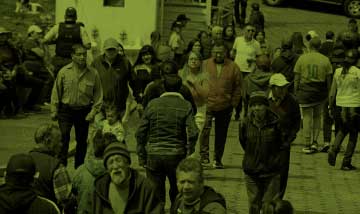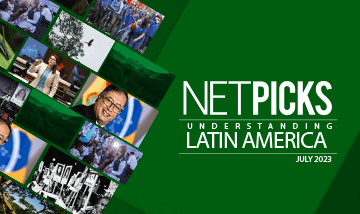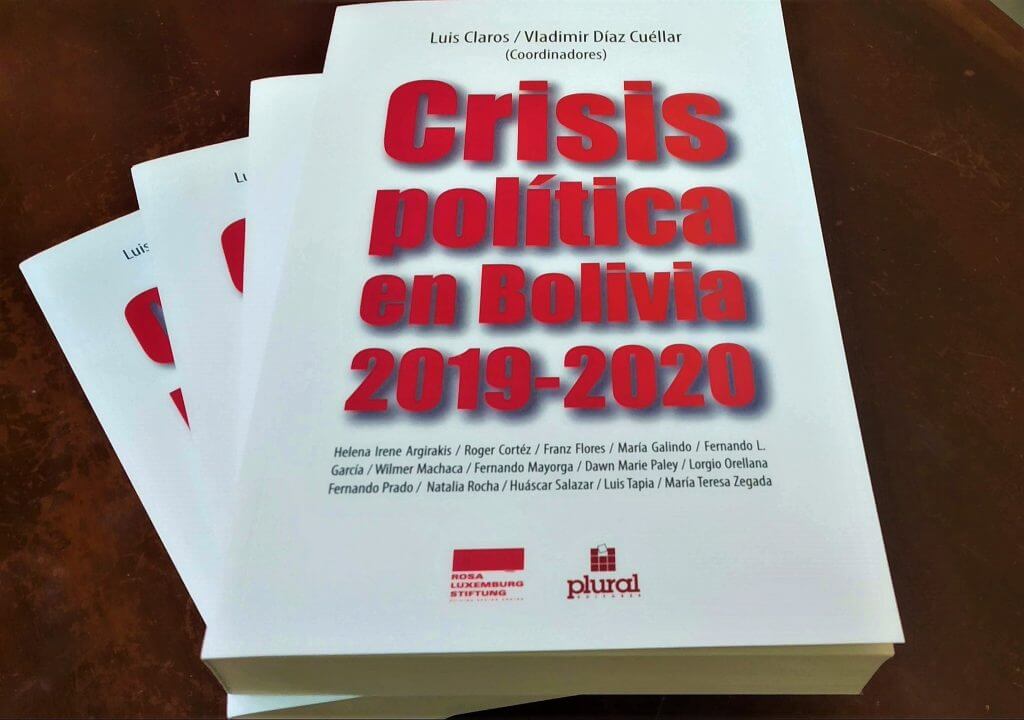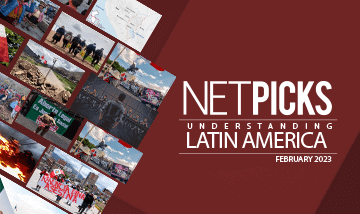Índice
Dear readers and colleagues, this month we bring you five articles that reflect the reality of Latin America: one each from Chile, Brazil and Colombia and two on the recent national strike in Ecuador.
- Chile’s identity crisis: the Mapuche still under fire
- The wide role Brazil’s military has played in the destruction of the Amazon
- Colombia’s truth commission is highly critical of U.S. policy
- The Ecuadorian national strike
.
CHILE’S IDENTITY CRISIS: THE MAPUCHE STILL UNDER FIRE
Days after the draft of Chile’ s new constitution was made public, President Gabriel Boric’s government declared a state of emergency in Araucanía, leading indigenous Mapuche leaders to ask whether Boric had snuffed out expectations of a new progressive Chile. To make matters worse, less than a week after the state of emergency went into effect, Juan Segundo Catril Neculqueo a leader of the Humberto Millahual Indigenous community and a believer in a peaceful solution to the conflict, was shot in the head while he was at work. Finding the culprits will not be easy, despite the modus operandi of Caril’s murder fitting the recent spate of attacks against Mapuche activists. The author contends the attacks have been carried out by local police and security firms working for forestry and salmon companies, along with supremacist groups such as the Asociación Para la Paz y Reconciliación en Araucania (APRA), a far-right group that claims to represent local business interests. Following the latest outbreak of violence, ex-police captain Miguel Ángel Toledo stated that the “state of emergency only serves the interests of forestry companies.” He talked of widespread corruption among police in Mapuche territory and the existence of security firms contracted by the forestry industry, that are composed of police officers and detectives in active service, with fake companies created to hide their identities. And as the vote on the new Constitution approaches, and with it the possibility privileges granted by the dictatorship may be lost, there is a fear that violence could increase. The problem for Boric is the present ‘complicated’ political context, with pressure mounting from groups with vested interests in the conflict. The inability of the new administration to respond to these challenges, says the author, shows how powerful shadowy right-wing forces still are in Chile. Admiral Miguel Angel Vergara has even made veiled threats: stating that “The country is not only threatened by eternal forces, but also most critically, from within. That is why, all true navy men, if necessary, are willing to do what it takes.”
Carole Concha Bell, May 31st, 2022.
https://nacla.org/chile-mapuche-boric-emergency
.
THE WIDE ROLE BRAZIL’S MILITARY HAS PLAYED IN THE DESTRUCTION OF THE AMAZON
The Amazon has been an obsession of Brazil’s military for some time. For the country’s Generals, the integration of the Amazon has always been an element of what the military institutes now call a “national project”. Under the dictatorship that began in 1964, Amazon policy was to “integrate not to surrender”; the rainforest was later perceived as a site for a possible insurrection, and in the ’80s and ’90s, the focus of Brazil’s generals became the incursion of Colombian left-wing guerrillas and the trafficking of drugs and weapons. Most recently, under President Jair Bolsonaro Brazil’s armed forces have been given powers to take “preventive and repressive actions against environmental crimes,” and for “surveying and fighting fires.” Of the 41 months since Bolsonaro came to power, says the author, the Amazon has been under military control for almost 17. And while spending on military missions in the Amazon grew by 178 percent, funding for forest preservation by the Ministry of the Environment fell; in 2021, 37 percent of total spending to fight deforestation was allocated to military actions. But despite military control and funding, deforestation has not been not controlled. Illegal gold mining in the region is also on the rise, and in August 2021 a study by the Federal University of Minas Gerais (UFMG) in partnership with the Brazilian Federal Public Ministry (MPF), showed that in 2019 and 2020, 28 percent of all gold that was both produced by and sold in Brazil appeared to have been mined illegally. According to the author, far from achieving the supposed purpose of reducing environmental destruction, military intervention has only led directly or indirectly, to tragedies in the region, and while the recent deaths of a British journalist and Brazilian indigenous expert are not attributable to the military, the author contends that the context of militarization of the Amazon had an indirect effect.
Pedro Marin, June 24th, 2022.
https://www.counterpunch.org/2022/06/24/the-wide-role-brazils-military-has-played-in-the-destruction-of-the-amazon/
.
COLOMBIA’S TRUTH COMMISSION IS HIGHLY CRITICAL OF U.S. POLICY
On Tuesday 28th of June, a Colombian government appointed truth commission released a comprehensive examination of the country’s brutal and long running internal conflict. The report is a result of the 2016 peace accords between the Colombian government the Revolutionary Armed Forces of Colombia, FARC, and took four years to put together. The document is based on more than 14,000 individual and collective interviews, and includes a new estimate of the number of people killed, 450,000, which is almost twice the number previously believed. Surprisingly, the account also contains classified US documents that show Washington believed for years that the Colombian military was engaged in extrajudicial killings and was working with right-wing paramilitaries, yet continued to deepen its relationship with the armed forces. The report will eventually consist of 10 chapters; including the two that were released on the 28th together with an 896-page summary of findings; the summary provides a detailed account of crimes the authors say were committed by the FARC, paramilitaries, state security forces and others. Amongst the report’s recommendations are increased oversight and accountability of the military and police; removing the national police from the ministry of defense; moving cases of members of the armed forces accused of crimes from the military to the civil justice system. The authors are also critical of U.S. policy, stating that a war against drug trafficking had disastrous social and environmental effects, turning poor farmers into enemies of the state and poisoning once fertile land. “The consequences of this concerted and largely U.S.-driven approach,” the report said, led to a “hardening of the conflict in which the civilian population has been the main victim.” President elect Gustavo Petro welcomed the report, while the Democratic Center, the party of current President Ivan Duque and former President Álvaro Uribe, released a statement referring to the report as an “interpretive truth.”
Julie Turkewitz and Genevieve Glatsk, June 28th, 2022.
https://www.nytimes.com/2022/06/28/world/americas/a-truth-commission-publishes-the-most-comprehensive-account-yet-of-colombias-war.html
.
THE ECUADORIAN NATIONAL STRIKE
We bring you two articles on the national strike in Ecuador. Beginning on June 13th and lasting a total of 18 days, the strike was called by the country’s largest indigenous organization, CONAIE (Confederation of Indigenous Nationalities of Ecuador). Together with student groups and labor unions, CONAIE put forward a list of 10 demands that included reducing fuel prices, halting the expansion of oil and mining exploration in sensitive areas, a debt moratorium for small and medium-sized farmers, subsidies for agricultural producers, and guarantees that key sectors of the economy would not be privatized. While mainly peaceful, there were outbreaks of violence, leading Amnesty International to release a statement affirming that the repression of the protests was causing a human rights crisis: by the time the strike was over, five people had died and hundreds had been injured. Negotiations between indigenous organizations and the government of banker Guillermo Lasso finally led to agreement on a number of the 10 demands, and the government now has 90 days to deliver solutions to the others. “Social peace will only be able to be achieved, hopefully soon, through dialogue with particular attention paid to marginalized communities, but always respecting everyone’s rights,” said the head of the Episcopal Conference, Monsignor Luis Cabrera, who acted as mediator.
IN ECUADOR, INDIGENOUS-LED NATIONAL STRIKE INTENSIFIES
Marc Becker, June 23rd, 2022.
https://nacla.org/ecuador-indigenous-national-strike
ECUADOR DEAL REACHED TO END WEEKS OF DEADLY PROTESTS AND STRIKES.
Associated Press, July 1st, 2022.
https://www.theguardian.com/world/2022/jul/01/ecuador-deal-reached-to-end-weeks-of-deadly-protests-and-strikes





